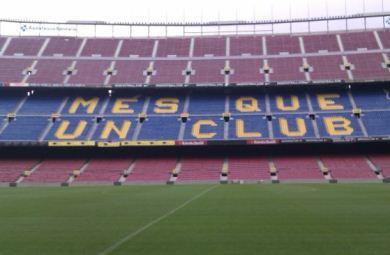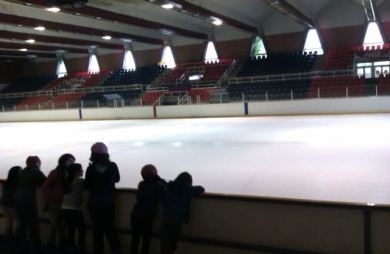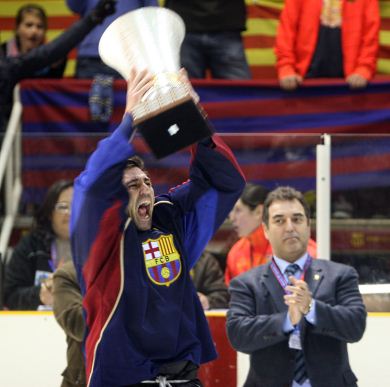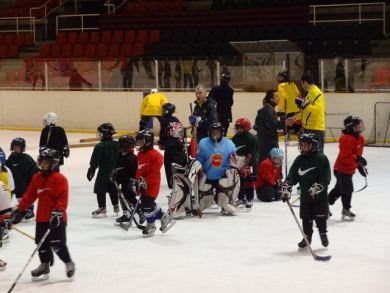BARCELONA – As hockey’s decision-makers from Europe and elsewhere are travelling to Barcelona for the Hockey Forum, let’s have a look at this Mediterranean pearl’s ice hockey history, deeply connected with the city’s iconic institution: FC Barcelona.
Click here for Barcelona Hockey Forum pages.Barcelona is a truly unique place, not only for its architectural and cultural beauty, its rich sport history, its food like Catalonia’s famous Paella and the beaches.
It’s also unique because, although outsiders see it as Spain’s second-biggest city, indigenous locals wouldn’t call themselves Spanish and see Barcelona first and foremost as the capital of Catalonia.
So be careful when calling somebody Spanish. This region has its different culture and different language. Locals wouldn’t pronounce the city “Barthelona”, the Spanish way (or Castellan, as the Spanish language is referred to in Spain), but make it sound like “Barselona”.
Of course the reality is a little bit different in this melting pot that is better off than other Spanish regions. With immigration from other parts of Spain and from Latin America, Barcelona is basically bilingual. While Catalan is heard in political institutions, announcements in the Metro, Barcelona’s subway, or in the sacred Camp Nou football stadium, you’d probably rather hear Spanish in the touristy downtown areas.
The city has had a radical face-lifting since overcoming the Spanish Civil War followed by the Franco dictatorship from 1939 to 1975 during which other cultures and languages such as Catalan or Basque were heavily suppressed. Especially since the 1992 Summer Olympics the city has become a nicer destination coming out of decades of depression.
During the tough years there was basically only one constant in the people’s life: FC Barcelona, one of the most famous sport brands in the world. And even this club has a very international history. It was founded in 1899 by a Swiss, Hans Gamper, who didn’t want to miss playing football after immigrating to Barcelona. He also took the red-and-blue colours from his former team FC Basel with him that have become the club’s trademark.
Same as the people, also FC Barcelona had to go through hard times. It was ordered to change its club name to the Spanish “Club de Fútbol Barcelona” and the yellow-and-red Catalan flag had to be removed from the club logo.
The club was not supposed to win championships, although it did. The clashes with Real Madrid, the club of the Spanish establishment, became emotionally charged during the Franco era. It was beyond sports, far beyond. FC Barcelona became an exile for Catalanism. People were able to show their identity without the risk of repression. From that area came the slogan “més que un club” – more than a club – as it is written in big yellow letters over the blue seats of the Camp Nou football stadium.
 The slogan “més que un club” (more than a club) is well visible for fans visiting the Camp Nou football stadium. Photo: Martin Merk
The slogan “més que un club” (more than a club) is well visible for fans visiting the Camp Nou football stadium. Photo: Martin MerkAfter the end of the dictatorship in the ‘70s the club switched back to its old club logo with the Catalan flag and changed to the Catalan name Futbol Club Barcelona that is used to this day.
And this is where ice hockey history in Barcelona begins. Although the club name indicates it’s all about football – and, admittedly, for many people it is – it also started to cultivate other sports around Camp Nou.
The ice rink opened in 1971 along with the sport arena Palau Blaugrana that is used for basketball, handball, roller hockey and futsal (a type of indoor football).
 Also FC Barcelona’s ice rink is themed in blue-and-red. Photo: Martin Merk
Also FC Barcelona’s ice rink is themed in blue-and-red. Photo: Martin Merk“Ice hockey in Barcelona has been played since the ‘70s. Many things have happened since,” says IIHF Council Member Frank Gonzalez.
There are not many people who would know more about the pioneer days of FC Barcelona’s ice hockey program than Gonzalez. Ice hockey is one of the six amateur sports played in FC Barcelona while four sectors are professional.
Born in Barcelona, Gonzalez, who is also Vice-President of the Spanish Ice Sports Federation (FEDH), was instrumental in the opening of the rink.
With ice hockey growing around Europe and roller hockey being a popular sport in Spain, FC Barcelona founded an ice hockey team after the inauguration of the rink.
“I was a former player of FC Barcelona, as was my son,” Gonzalez says. “I first went there as a football player and played there as a junior, but then I grew up in Canada and took up hockey. When they were building the ice rink I was back and helped them put the ice in as there were not many people who could skate. I was the first skater at the arena when it was built.”
Gonzalez became an ice hockey player for FC Barcelona, later also for other clubs in the country and for the Spanish national team that joined the World Championship program in 1977 with Gonzalez being the captain.
“It’s a very special club with many roots. It’s very special for people in Catalonia to be part of the club, no matter what sport it is,” Gonzalez says about the meaning of wearing the FCB jersey as a hockey player.
Ice hockey is mostly played in the northern parts of Spain and the Madrid area with the most successful clubs coming from even further north than Barcelona like Puigcerdà and Jaca in the Pyrenees, and earlier also Donostia/San Sebastian from the Basque Country.
FC Barcelona has won four national ice hockey championships, most recently in 2009 when the Pista de Gel was sold out with 1,500 fans in the Catalan derby against Puigcerdà.
 FC Barcelona’s captain hoists the trophy after winning the Spanish final against Puigcerdà in 2009. Right: IIHF Council Member Frank Gonzalez. Photo: FEDH
FC Barcelona’s captain hoists the trophy after winning the Spanish final against Puigcerdà in 2009. Right: IIHF Council Member Frank Gonzalez. Photo: FEDHDespite the amateur status, the team is very international and has had players who speak a variety of languages: Catalan, Spanish, English, Russian and Swedish.
Although ice hockey is not a main sport in Spain, it has improved in the last few years.
“Most of the time the sport was governed by a Winter Sports Federation, which never really understood our sport as they were mostly ski people,” Gonzalez said. “Six years ago we separated to become an Ice Sports Federation.”
Since the separation the men’s national team has gone from 36th to 29th in the IIHF World Ranking and also women’s hockey was introduced.
 FC Barcelona juniors at a hockey practice in the club’s Pista de Gel. Photo: Szymon Szemberg
FC Barcelona juniors at a hockey practice in the club’s Pista de Gel. Photo: Szymon Szemberg“Lately FC Barcelona is doing everything to keep ice hockey going in the club and hopefully together with the federation they will do that,” Gonzalez says about today’s situation in the Catalan metropolis.
“The difficulty is that the ice rink is more considered as a rink for public skating and figure skating, and ice hockey is not that popular in Spain, although we’re slowly building it up and we will host an Olympic Qualification event in Barcelona.”
Barcelona has big plans and might apply for the 2022 Olympic Winter Games with the Pyrenean Mountains in proximity. At the same time FC Barcelona plans to build new facilities for indoor sports while tearing down the old ones to make space for football facilities in the Camp Nou area.
“This is still to be worked at,” Gonzalez says about the Olympic dreams, “but to be able to do that, they are looking at building a new ice rink that would belong either to the club or to the city. But I think that will take five or six years.”
Meanwhile, delegates coming for the 2012 Hockey Forum have the chance to witness the charm of the current rink from the old days when Spain started to compete in international ice hockey. It is just a mighty slapshot away from the forum’s hotel.
If you walk by the stadium in the area of the FCB Museum and the ticket booths, just watch out for the Catalan expression for ice rink: Pista de Gel. The rink might be open even in these warm days. And if you don’t hit the ice, you might at least want to have a snack or drink in the rink’s restaurant and watch kids skate or practise.
MARTIN MERK









